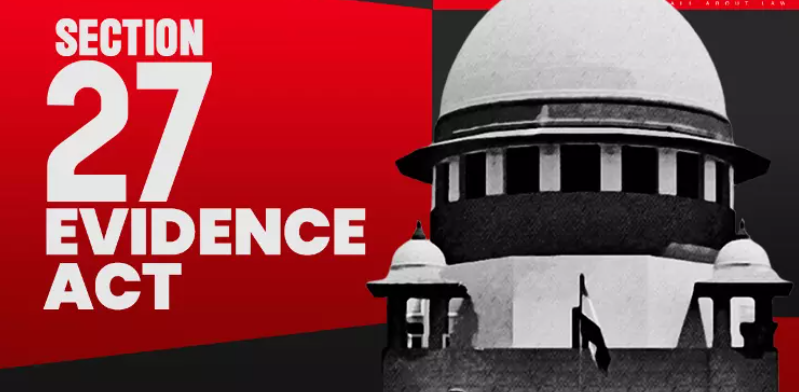Section 27 of the Indian Evidence Act (GS Paper 2, Governance)

Context and Background:
- On August 14, 2024, the Supreme Court of India delivered a significant judgment regarding Section 27 of the Indian Evidence Act.
- This ruling emphasizes the criteria for admissibility of statements made by an accused under police custody, particularly focusing on whether these statements reveal new facts not already known to the authorities.
Indian Evidence Act, 1872:
- Historical Background: The Indian Evidence Act, 1872, was introduced during British rule as a means to provide a standardized framework for the admissibility of evidence in Indian courts. Prior to its enactment, Indian legal procedures were governed by a range of traditional practices, which varied significantly across regions.
- Purpose: The primary goal of the Act was to ensure uniformity, fairness, and consistency in the handling of evidence in legal proceedings. It aimed to replace diverse traditional practices with a cohesive legal standard.
Replacement by Bharatiya Sakshya Adhiniyam:
- Modernization: On July 1, 2024, the Indian Evidence Act was superseded by the Bharatiya Sakshya Adhiniyam. This new legislation reflects contemporary legal standards and incorporates modern practices in evidence law, aligning Indian evidence rules with global standards and practices.
Section 27 of the Indian Evidence Act:
- Provision Details: Section 27 states that any information or fact disclosed by an accused person while in police custody can be admitted as evidence if it leads to the discovery of a fact related to the crime that was not previously known to the police.
- Exception to General Rule: This provision is an exception to the general rule that confessions made to police officers are inadmissible in court. Section 27 allows such confessions to be admissible if they lead to the discovery of new and relevant facts.
- Purpose: The purpose of this section is to encourage the disclosure of crucial evidence by the accused that can aid in solving crimes, while balancing the rights of the accused.
Supreme Court Ruling:
- Disclosure Requirements: The Supreme Court clarified that for a statement made under Section 27 to be admissible, it must reveal new and previously unknown facts. If the police already knew the fact disclosed by the accused, the disclosure does not qualify as additional evidence.
- Case Summary: In the case in question, the accused had disclosed the location of the crime scene. However, since the police were already aware of this detail before the disclosure, the Supreme Court deemed this disclosure as not providing new evidence.
- Impact on Conviction: The Supreme Court’s ruling resulted in the reversal of a murder conviction. The prosecution had relied on the accused’s disclosure of the crime scene, but since this information was already known to the police, it was not considered valid evidence under Section 27. Consequently, the evidence was deemed insufficient for conviction.
Implications of the Ruling:
- Burden of Proof on Prosecution: The ruling reinforces that the prosecution bears the burden of proving that any evidence obtained through an accused’s disclosure under Section 27 is genuinely new and previously unknown to the authorities. This requirement ensures that the evidence is not merely a confirmation of what the police already knew.
- Preventing Misuse: By setting a clear criterion that only new information is admissible, the ruling aims to prevent potential misuse of confessions or disclosures made under police custody. It ensures that such disclosures are used appropriately and are not exploited to secure convictions without substantial evidence.
- Safeguarding Rights: The judgment upholds the rights of the accused by ensuring that confessions or disclosures cannot be used as evidence if they do not introduce new facts. This contributes to a fairer judicial process and helps prevent wrongful convictions based on previously known information.
Conclusion:
- The Supreme Court’s ruling on Section 27 of the Indian Evidence Act marks a critical development in Indian criminal jurisprudence.
- It emphasizes the need for disclosures made by an accused in police custody to provide new and previously unknown facts to be admissible as evidence.
- This decision upholds the integrity of the judicial process, ensures fairness in the treatment of evidence, and protects the rights of the accused.
- By reinforcing the principle that evidence must be genuinely novel, the ruling contributes to a more transparent and just legal system.


